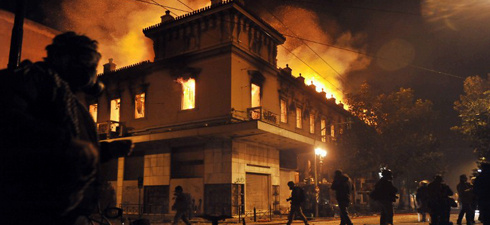It is one of the tragic delusions of the human race that we believe in the inevitability of progress. We look around us, and we seem to see a glorious affirmation that our ruthless species of homo is getting ever more sapiens.
We see ice cream Snickers bars and in vitro babies and beautiful electronic pads on which you can paint with your fingertip and – by heaven – suitcases with wheels! Think of it: we managed to put a man on the moon about 35 years before we came up with wheelie-suitcases; and yet here they are. They have completely displaced the old type of suitcase, the ones with a handle that you used to lug puffing down platforms.
Aren’t they grand? Life seems impossible without them, and soon they will no doubt be joined by so many other improvements – acne cures, electric cars, electric suitcases – that we will be strengthened in our superstition that history is a one-way ratchet, an endless click click click forwards to a nirvana of liberal democratic free-market brotherhood of man. Isn’t that what history teaches us, that humanity is engaged in a remorseless ascent?
On the contrary: history teaches us that the tide can suddenly and inexplicably go out, and that things can lurch backwards into darkness and squalor and appalling violence.
The Romans gave us roads and aqueducts and glass and sanitation and all the other benefits famously listed by Monty Python; indeed, they were probably on the verge of discovering the wheely-suitcase when they went into decline and fall in the fifth century AD.
Whichever way you look at it, this was a catastrophe for the human race. People in Britain could no longer read or write. Life-expectancy plummeted to about 32, and the population fell. The very cattle shrunk at the withers. The secret of the hypocaust was forgotten, and chilblain-ridden swineherds built sluttish huts in the ruins of the villas, driving their post-holes through the mosaics.
In the once bustling Roman city of London (for instance) we find no trace of human habitation save for a mysterious black earth that may be a relic of a fire or some primitive system of agriculture.
Do you like our work?
Help multilingual European journalism to thrive, without ads or paywalls. Your one-off or regular support will keep our newsroom independent. Thank you!












